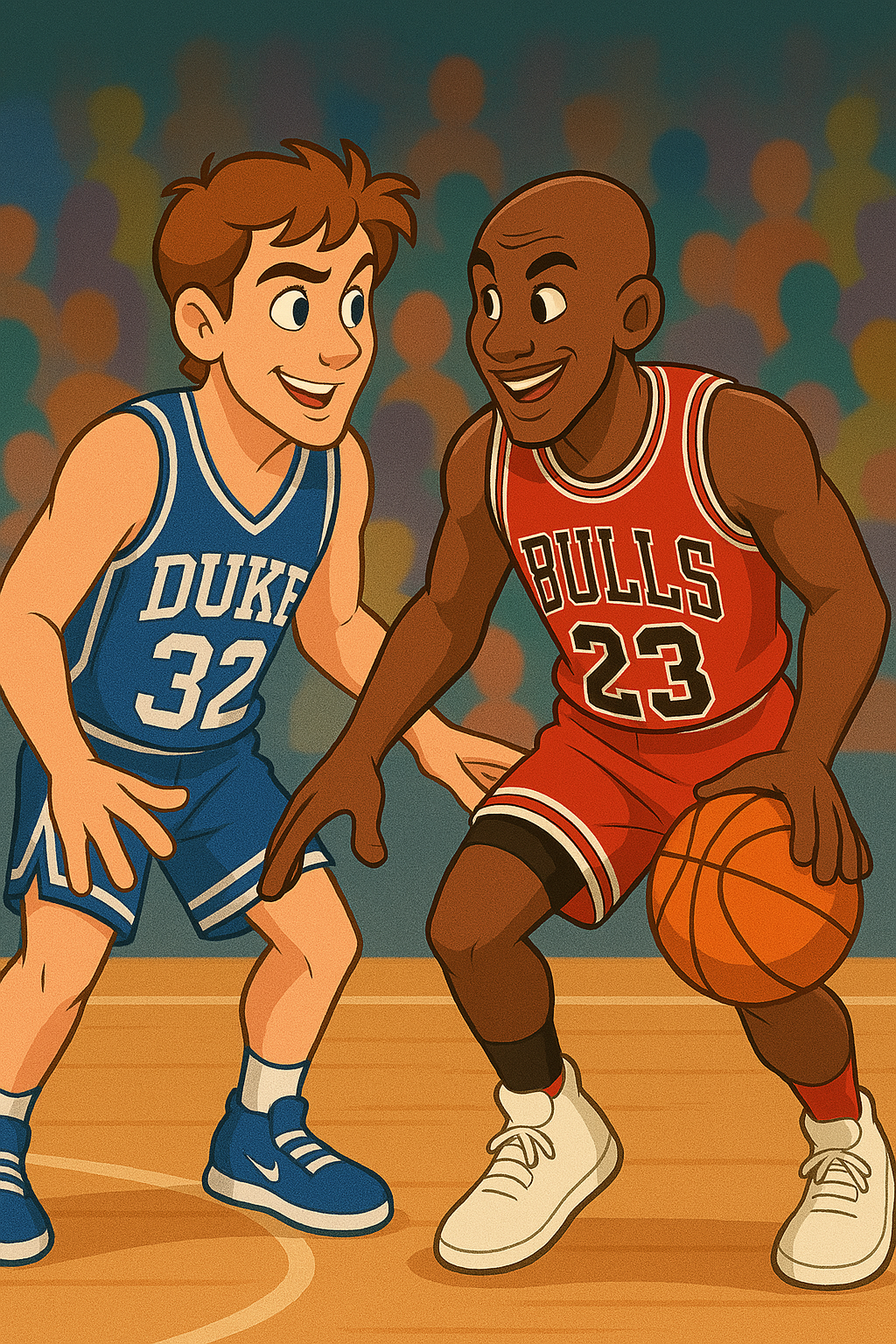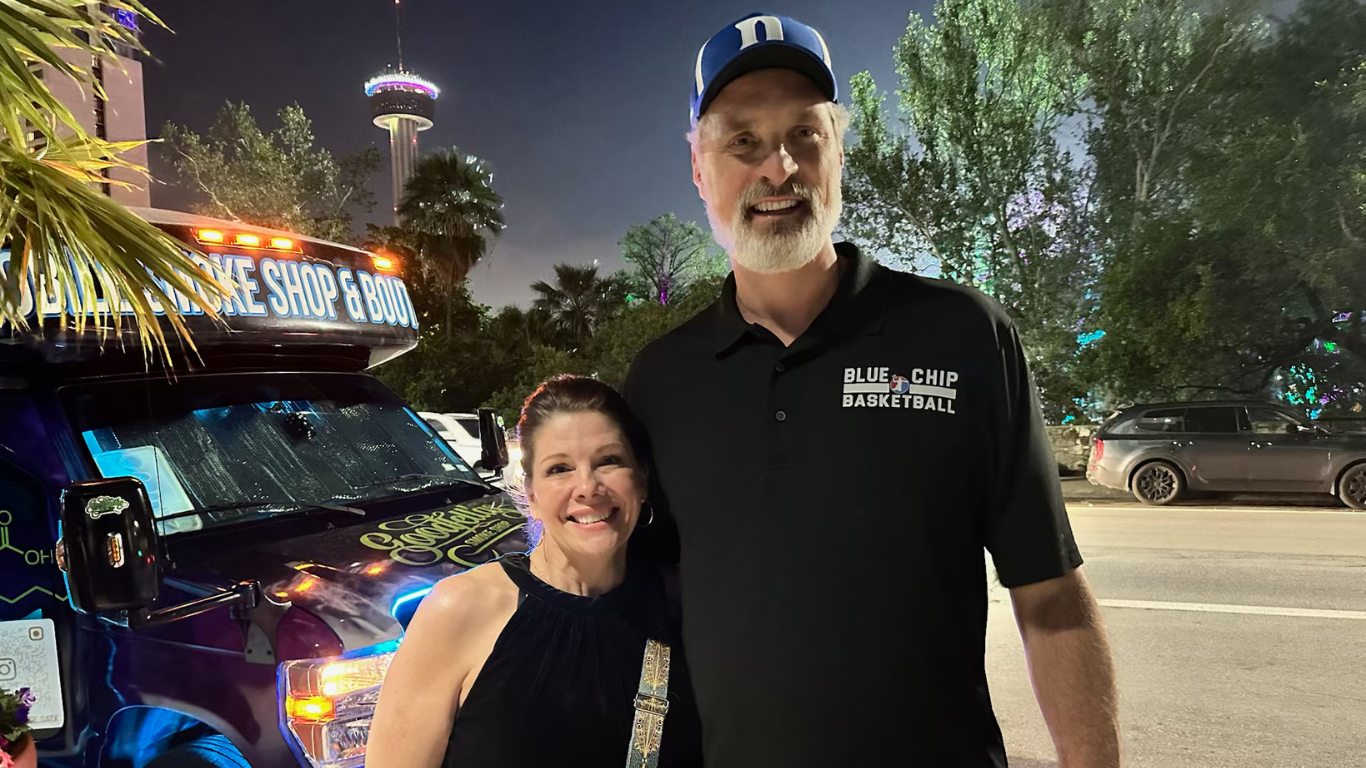
Stay Informed
Get the latest news, trends, and industry insights.
This year The Brand Leader® turns 25. That's a quarter of a century helping companies find—and sometimes rediscover—their true identity. This milestone had me reflecting a lot lately: about brands, yes, but also about people. Because in my experience, branding is less about logos and taglines, and more about identity. Who you are, really. Who you’ve been. Who you’re becoming.
And nothing reminded me more of that truth than attending this year’s NCAA Final Four with my wife.
Now, my wife is a lifelong Duke fan—she bleeds blue. For her, there’s no one like Christian Laettner. The guy is her all-time favorite player—despite, or maybe because of, the fact that he was once one of the more hated figures in college basketball. He was brash, confident, unapologetic—and for many, that rubbed the wrong way. But this year, after 33 years since “The Shot”, she finally got to meet him.
We spotted him walking down the Riverwalk. She approached him, nervously, and asked for a photo. Not only did he say yes, but chit-chatted, was so surprisingly gracious, after the picture, he even paused, leaned over, and asked, “Did it come out okay?”
He waited to make sure the moment really happened. That kindness, that thoughtfulness—it said everything. Christian Laettner, once hated by a segment of the nation, had evolved into a gracious legend.
He didn’t need to tell us who he is now.
He showed us.
And that, to me, is the essence of branding. You can’t fake authenticity. Not over time. You can try to package it, spin it, hide behind PR—but eventually, the truth gets revealed. In quiet moments. In the way you act when no one’s watching. In the way you handle defeat or fame or criticism. Or even a simple photo request.
Brands, like people, are stories in progress.

Branding isnt about perfection. It's about truth. And truth, over time, earns trust.
Another legend comes to mind: Michael Jordan (do I even need to link this?). Universally acknowledged as the GOAT. But when Netflix's The Last Dance aired, we saw another side of him—the intensity, the sacrifices, the sometimes brash, confrontational and even seemingly divisive in-your-face interactions with teammates. That documentary didn’t tarnish his brand; it deepened it. It reminded us that greatness often comes with a price. That even icons are complicated. And it gave his brand more authenticity, not less.
Because again, branding isn’t about perfection. It’s about truth. And truth, over time, earns trust.
Over the years, we’ve worked with companies at every stage—startups searching for their voice, legacy brands losing relevance, organizations dealing with PR crises. We’ve seen again and again how powerful the passage of time can be. How a brand that once felt misunderstood, off-course, or even damaged can still change its story.
But the catch is—a brand can’t be manufactured. Identity, meaningful change, even re-invention has to start from the inside out.
The brands that successfully transform have done the deep—sometimes painful—work of asking: Who are we now? What do we believe? What are we willing to let go of? They shed the dead skin of old campaigns, outdated language, and reactive messaging. Only then can they begin to live in a new identity—one that’s real, not aspirational.
Time gives you the opportunity to evolve. But you have to do the work.
That truth was on full display at the team hotel after Duke’s heartbreaking loss this year. We happened to be there when the players returned. You could feel the devastation in the air—heads low, eyes red, the finality of the season setting in. But what struck me most wasn’t the loss. It was what happened around it.
Parents hugging their kids. Fans clapping softly, not out of celebration, but solidarity. Strangers offering kind words. The players weren’t being treated like failures. They were being seen as human beings. And in that moment, it was clear: identity isn’t formed by wins or losses. It’s formed by how you show up, how you handle the highs and the lows, and how you carry yourself through the journey. Ironically, the tournament theme, “one shining moment,”is a fallacy… And each of those student athletes will have a decision to make, whether the loss defines their life, or whether they see the remarkable journey they had this year, day after day, as humans… and that this was just a painful moment along the way that ultimately they can use to grow from, and shape their future identity.
Jordan lost far more games in his life than he won. He didn’t even make varsity his sophomore year of high school. But he became the GOAT through resilience, passion, and relentless evolution. That’s the secret sauce—not the trophies, but the growth.
So as I look back on 25 years in the branding world, here’s what I’ve learned:
- A brand is not a campaign. It’s a character.
- Your story can always change—but it has to be true.
- Time doesn’t heal all wounds, but it can reveal transformation.
- The most powerful branding tool you’ll ever have is consistency in your authenticity.
- And perhaps most importantly—losing doesn’t define your legacy. How you respond does.
I’m incredibly proud of the work we’ve done as an agency over the past two and a half decades. We’ve seen companies grow, fall, rise again. We’ve helped launch new ideas and reimagine old ones. And I’ve been lucky to witness firsthand how brands—and people—can evolve into their best selves.
Christian Laettner didn’t change overnight. Neither did Jordan. Neither have we. But with time, truth, and the willingness to grow, anything is possible.
Here’s to the next chapter. And to building brands that stand the test of time—not because they’re perfect, but because they’re real.
Stay Informed




